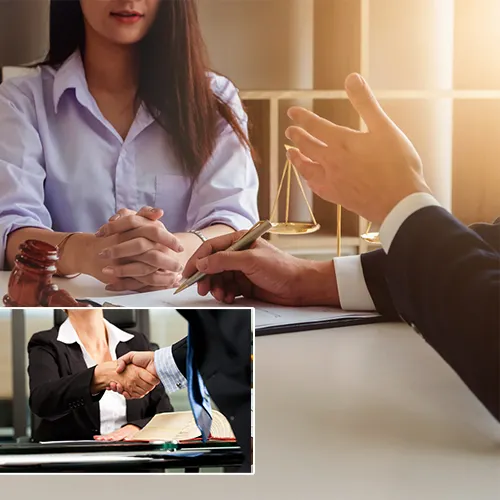Understanding Your Rights: DUI Checkpoint Legality Essentials
Table of Contents []
DUI Checkpoint Legality
Understanding DUI Checkpoint Legality with Amy Mc Lean Law Office

At Amy Mc Lean Law Office, we recognize the significance of DUI checkpoints in maintaining road safety and minimizing the risks associated with impaired driving. However, these checkpoints also come with their share of legal complexities and debates. We are committed to providing accessible resources that cover the intricacies of DUI checkpoint legality. By doing so, we ensure that everyone we serve is well-informed about their legal rights and the obligations of law enforcement officials during such stops.
Educating the public on these crucial issues is a cornerstone of our mission. When you might face a DUI checkpoint, it's important to understand both the intent behind these checks and the legal framework that governs them. Whether you're curious about your rights or what steps the police must take, our goal is to demystify the process so you can navigate these situations with confidence.
Moreover, if you find yourself in need of legal assistance regarding a DUI checkpoint incident, we can connect you with expert attorneys to guide you through your options. The law can be complicated, but with our resources and the support of legal professionals, you don't have to face it alone. For inquiries or to book an appointment, please don't hesitate to contact us at (512) 309-4322.
The Legality of DUI Checkpoints
DUI checkpoints are designed as a preventive measure to deter the occurrence of alcohol-related incidents on the road. While their legality has been upheld by the Supreme Court, states may have their own rules and restrictions governing how and when these checkpoints can be conducted. This underscores the need to understand both federal and state laws, which our resources aim to clarify.
At the federal level, the Supreme Court has determined that DUI checkpoints are legal under the U.S. Constitution. However, individual states have the power to implement additional laws or to reject the use of DUI checkpoints altogether. It's this interplay between federal oversight and state jurisdiction that can complicate understanding your rights at these stops.
Knowing Your Rights at a DUI Checkpoint
When stopped at a DUI checkpoint, knowing your rights is paramount. Though officers have the authority to briefly stop vehicles, there are boundaries to what they can do without probable cause or consent. Our resources provide in-depth information on your rights during these interactions.
If an officer stops you, you have the right to remain silent, refuse to consent to a search of your vehicle, and the right to speak with an attorney if you're detained or arrested. Recognizing these rights is key to protecting yourself legally; however, it's equally important to comply with lawful orders and to always remain respectful to law enforcement personnel.
Proper Procedures at DUI Checkpoints
Law enforcement must adhere to a set of rules when conducting DUI checkpoints. These range from having a systemic way of stopping vehicles to providing adequate signage and lighting. The procedures in place are not just for the officers' safety but also to protect the rights of the motorists.
A failure to follow proper procedures can infringe upon your rights and possibly affect the legality of the DUI checkpoint itself. Our resources shed light on what those correct procedures are, and how you can recognize whether they have been followed during your stop.
Connecting with Expert Attorneys
Should you be affected by an incident at a DUI checkpoint, having professional legal representation is crucial. Our network includes attorneys adept at navigating the complexity of DUI laws, ensuring you receive the expertise necessary to address your situation effectively.
By providing valuable connections to legal experts, we support those who encounter difficulties at DUI checkpoints. These attorneys can offer guidance that is tailored to your individual circumstances and the specific laws in your state.
Legal Requirements of DUI Checkpoints Explored

DUI checkpoints are subject to detailed legal requirements, aimed at safeguarding individual civil liberties while allowing law enforcement to perform critical public safety functions. Understanding these legal mandates is essential when passing through a checkpoint. At Amy Mc Lean Law Office, we believe that knowledge is power, and we are determined to equip you with that power.
Law enforcement agencies must carefully plan and execute DUI checkpoints to comply with legal standards. This often involves strategic selection of checkpoint locations based on statistical data, clear indication of the checkpoint to oncoming traffic, and the use of neutral criteria for stopping vehicles. Transparency and adherence to protocol are non-negotiable aspects of legal DUI barrier stops.
Our comprehensive resources aim to break down these requirements so that you can better understand what is expected from law enforcement during DUI checkpoints. Whether you're questioning the legality of a checkpoint you've encountered or simply seeking clarity on the topic, we're here to assist. Contact us at (512) 309-4322 to find out more.
Selection and Announcement of Checkpoint Locations
The process of selecting where to set up DUI checkpoints is not random. Law enforcement agencies are expected to use data-driven approaches, choosing locations with histories of alcohol-related incidents. They are also often required to publicly announce the times and general locations of checkpoints in advance, which adds to their preventive effect and transparency.
By having transparent criteria for the checkpoint location and advance public notice, citizens are reassured that such stops are conducted in their best interest, aimed at reducing DUI incidents rather than arbitrarily detaining drivers.
Neutral Criteria for Vehicle Stops
It is required that officers use a neutral formula for stopping vehicles, such as every third car, to prevent potential discrimination or bias. Knowing what to expect and why certain vehicles are being stopped helps to assure you that the checkpoint is being managed impartially.
Understanding the criteria used at checkpoints can provide peace of mind and assist you in recognizing whether your rights have been respected during a stop. We strive to clarify these procedures, so you're equipped with the knowledge to assert your rights.
Following Constitutional Guidelines
DUI checkpoints must adhere to constitutional guidelines, balancing the state's interest in preventing DUIs with individual constitutional rights. This means that while officers are permitted to briefly detain drivers, any further detention or search must be based on probable cause or explicit consent.
When officers overstep these boundaries, they risk violating constitutional rights, which can have serious legal implications for both the driver and the enforcement agency.
State-Specific DUI Checkpoint Laws
While federal legal precedent allows DUI checkpoints, several states opt to impose their own regulations or even prohibit these stops entirely. A thorough understanding of state-specific laws is necessary to ensure your rights are being protected.
Our resources offer up-to-date information on the legality of DUI checkpoints in various states, which is essential knowledge for anyone traveling across state lines. Amy Mc Lean Law Office remains dedicated to providing you with the information you need, in a clear and understandable format.
Protecting Your Rights at DUI Checkpoints

Encountering a DUI checkpoint can be a daunting experience, but being aware of your rights can make all the difference. We believe that informed citizens are empowered citizens, and that's why at Amy Mc Lean Law Office, we've taken great care to compile resources that protect your interests and ensure fair treatment under the law.
When you approach a checkpoint, it's crucial to be aware of how to conduct yourself and understand what you are legally obliged to do-and what you are not. Should your rights be infringed upon, this knowledge becomes indispensable in seeking recourse through legal channels.
We encourage anyone who faces legal issues related to DUI checkpoints to reach out. Our dedicated team and our network of legal professionals are here to assist you. For more information or to schedule a consultation, please get in touch with us at (512) 309-4322.
Conducting Yourself at DUI Checkpoints
Remaining calm and respectful during a DUI checkpoint can immensely influence the encounter. Having your driver's license and registration ready, along with being polite in your interactions with law enforcement, promotes a smooth process for everyone involved.
However, being prepared also means knowing that you have the right to decline answering questions or consenting to a search without probable cause. Understanding this balance between cooperation and assertion of rights is essential.
Legal Obligations When Stopped
You are legally required to stop at a DUI checkpoint and present your license and registration if requested. Ensuring that you fulfill this basic obligation can prevent unnecessary complications and demonstrate your willingness to cooperate with the authorities.
Having a clear sense of these obligations can help avoid misinterpretations that might arise during a checkpoint stop. Our aim is to clarify these elements for you, so that your rights and responsibilities are crystal clear.
Seeking Recourse for Rights Violations
No one should be subject to a violation of their rights at a DUI checkpoint. If you believe that you or someone you know has experienced such a violation, seeking legal support is a critical next step. Our network of attorneys is readily available to provide the guidance and representation needed to address these concerns appropriately.
Dealing with rights violations at a DUI checkpoint can be overwhelming, but remember that help is just a phone call away. Our commitment to justice ensures that you won't have to handle these situations alone.
Consultation with Legal Professionals
Consulting with a legal professional can clarify any doubts you might have about your encounter at a DUI checkpoint and offer a plan for moving forward. Open communication with your attorney about the details of the stop is vital for accurate counsel.
Our resources and the availability of knowledgeable attorneys mean that no question will go unanswered. Whether you need immediate advice or long-term representation, we're here to connect you with the right legal experts.
How Amy Mc Lean Law Office Can Help in DUI Checkpoint Matters

In facing the complexities associated with DUI checkpoints, it's reassuring to have professional resources at your fingertips. Amy Mc Lean Law Office doesn't just offer a wealth of information; we provide a direct line to support and legal expertise that can advocate for your rights and guide you through the legal landscape.
Our role extends beyond just education-we are an intermediary that bridges the gap between the public and the legal professionals adept at handling cases involving DUI checkpoints. Whether it's answering queries, clarifying procedures, or addressing concerns, our commitment to serving your needs remains steadfast.
Don't let uncertainty regarding DUI checkpoints leave you at a disadvantage. Empower yourself with knowledge and take advantage of the expertise we offer. Should you need guidance, remember that we are just a call away at (512) 309-4322.
Answering Your Queries
We know that questions may arise at any moment regarding DUI checkpoints and related legalities. That's why we strive to make sure all your queries are addressed with clear, well-researched answers.
Our resources are designed to simplify complex legal matters, making them understandable for anyone who needs the information. No matter your question, we stand ready to provide answers.
Clarifying Checkpoint Procedures
A clear understanding of checkpoint procedures not only helps in confirming the legality of a stop but also in building your confidence when approaching a checkpoint. We take great pride in offering detailed insights on what to expect and how to act.
By familiarizing yourself with the correct procedures, you can better assess the situation and protect your rights if they are ever in question.
Addressing Your Concerns
We understand that concerns about rights, legalities, and potential consequences might arise during or after a DUI checkpoint stop. Ensuring that you are heard and that your concerns are taken seriously is an integral part of our support system.
We're not just here to supply information; we're here to listen and to provide practical support tailored to your needs.
Expert Legal Representation
When a consultation turns into a need for legal representation, notable advocacy is crucial. We partner with attorneys who excel in DUI law and who understand the nuances of checkpoint regulations both federally and at the state level.
Their expertise ensures you receive the high-quality legal support you deserve. With informed and proactive representation, facing the aftermath of a DUI checkpoint doesn't have to be a daunting prospect.
Always know that Amy Mc Lean Law Office is here to serve as your ally in navigating DUI checkpoint issues and protecting your rights. For further assistance, an open conversation, or to book an appointment with a legal professional, please reach out to us at (512) 309-4322. Our knowledgeable team is waiting to assist you with the utmost confidence and care that everyone deserves when faced with legal uncertainties. Together, we can ensure that your rights are respected and that you have the necessary information to make informed decisions. Let us be your trusted guide through the legal intricacies that DUI checkpoints present.
